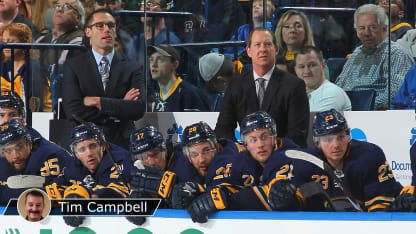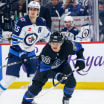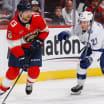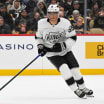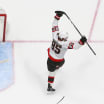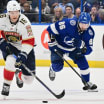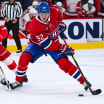"There were times I tried to remain as positive as I could, but you get frustrated," he said. "But I have learned a lot about having patience. And also trying to push the buttons at the right time and holding players accountable."
Housley has found the proper formula this season, Eichel said.
'At times when he's expecting more, he tells us that," Eichel said. "And at times when he's happy with where we're headed, he's letting us know. We're learning, he's learning and we're all just trying to get better."
Housley, selected by the Sabres in the first round (No. 6) of the 1982 NHL Draft, played his first eight seasons with Buffalo and had 558 points (138 goals, 380 assists) in 608 games. He retired in 2003 after playing in 1,495 games during 21 NHL seasons with the Sabres, Winnipeg Jets, St. Louis Blues, Calgary Flames, Chicago Blackhawks, New Jersey Devils, Washington Capitals and Toronto Maple Leafs, finishing with 1,232 points (338 goals, 894 assists), the most by a U.S.-born defenseman. Housley is fourth all-time in scoring among NHL defensemen and was inducted into the Hockey Hall of Fame in 2015.
A transition from playing excellence to coaching excellence does not surprise Ed Olczyk, a former teammate with the Jets.
"Howie was always a guy who was one step ahead as a player," said Olczyk, who coached the Pittsburgh Penguins (2003-06) and is a TV analyst for NBC Sports and the Chicago Blackhawks. "He had great instincts and such a feel for the game. And he's been able to translate that as a coach.
"I know, talking to a lot of guys in Nashville, when he was an assistant there, they said he could deliver the message in a way that players could relate to. When he played, his offensive level was on another level. Sometimes when players are that skilled and great, they can't, in layman's terms, express themselves."
Predators defenseman Ryan Ellis said Housley never had an issue in relaying his modern and progressive approach as an assistant under Peter Laviolette. The Predators reached the Stanley Cup Final in 2017, losing to the Pittsburgh Penguins in six games, in Housley's final season before he was hired in Buffalo.
"He was a great coach for all the D and what he did for our games inside our locker room," Ellis said. "We'll always forever be grateful to him."
